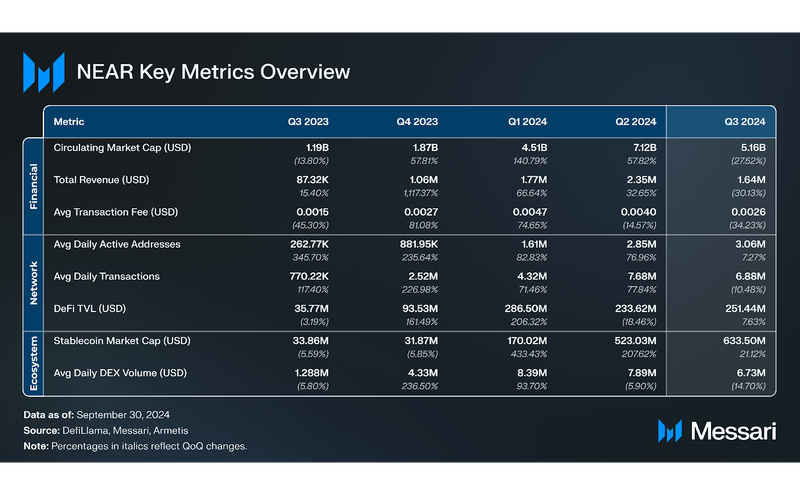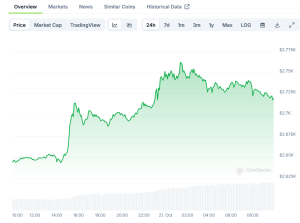Key Insights
- NEAR’s stablecoin market cap ended Q3 2024 at ~$633.50 million, up ~21.12% QoQ, driven by a renewed focus on DeFi.
- The NEAR Foundation continues its focus on AI development by launching an AI Accelerator in collaboration with Delphi Labs and running the [REDACTED] hackathon with over $900,000 in prizes.
- Grayscale launched a Decentralized AI Fund with NEAR as a main holding.
- Nightshade 2.0 launched in Q3 2024, marking a key progression in the vision of chain abstraction and onboarding one billion users.
- The “House of Stake” governance proposal introduces a new token, veNEAR, to aid in reshaping NEAR’s governance process.
Primer
NEAR Protocol (NEAR) is a smart contract platform that utilizes a Thresholded Proof-of-Stake (PoS) consensus algorithm to execute transactions. NEAR incorporates the Nightshade 2.0 sharding mechanism, which facilitates increased transaction throughput and scalability by taking a novel approach to basic network functionality, and is EVM-compatible via Aurora.
The NEAR ecosystem is expanding chain abstraction across more blockchains and ecosystems, with the goal of abstracting the blockchain away from the user and developer experience. The vision for chain abstraction is to enable applications to function seamlessly across all blockchains, with effortless onboarding and features like gas fees and bridging becoming invisible to the end users. To achieve this, NEAR is focusing on a few key initiatives, including Account Aggregation, building a blockchain infrastructure stack that can power the chain abstraction thesis, NEAR Data Availability, Fast Finality with Eigenlayer, and a hyper-scalable Layer-1 through Nightshade 2.0 sharding technology. As of Q3 2024, NEAR runs on six shards and aims to scale to ten shards by the end of the year.
NEAR Foundation is focusing efforts and resources on enabling the network to become the home for User-Owned AI. The NEAR Foundation is investing significant capital and resources in creating the best ecosystem for the development of User-Owned AI, including core AI infrastructure investments through the NEAR Horizon AI Incubator, the NEAR Foundation x Delphi Labs AI Accelerator, and additional R&D efforts through NEAR.AI. The NEAR AI ecosystem now includes over 50 teams building at every layer of the User-Owned AI stack.
Website / X (Twitter) / Discord
Key Metrics
Financial Analysis
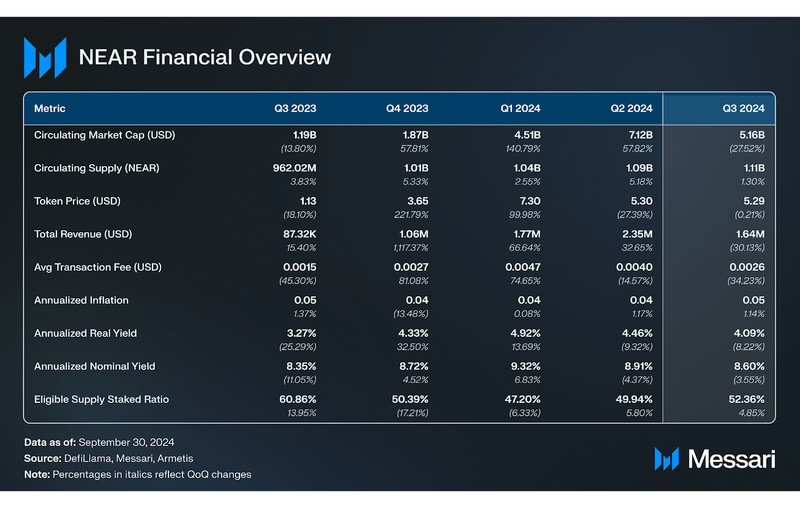
Market Cap and Price
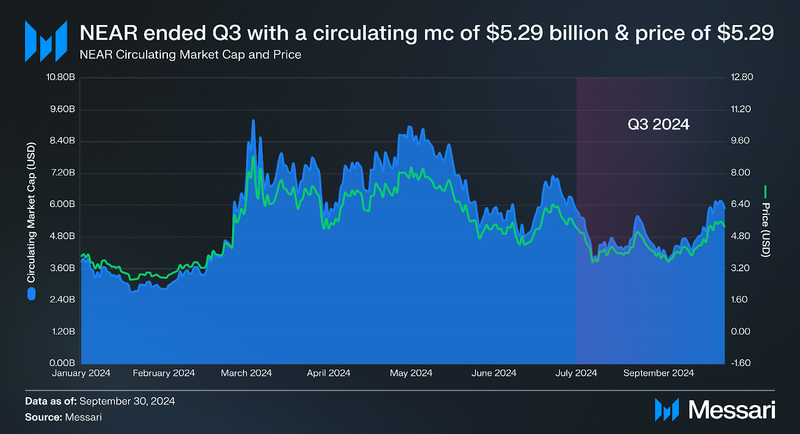
The crypto market experienced a downturn in Q2 2024, which also affected NEAR. In Q3, NEAR’s downward trend initially continued before eventually finding support. It ended the quarter with a circulating market cap of ~$5.16 billion, a ~27.52% decrease QoQ, while the token price retraced to ~$5.29, a ~0.21% decrease QoQ. NEAR was able to maintain its market cap ranking of 17th overall, indicating it performed similarly to other leading assets.
Revenue
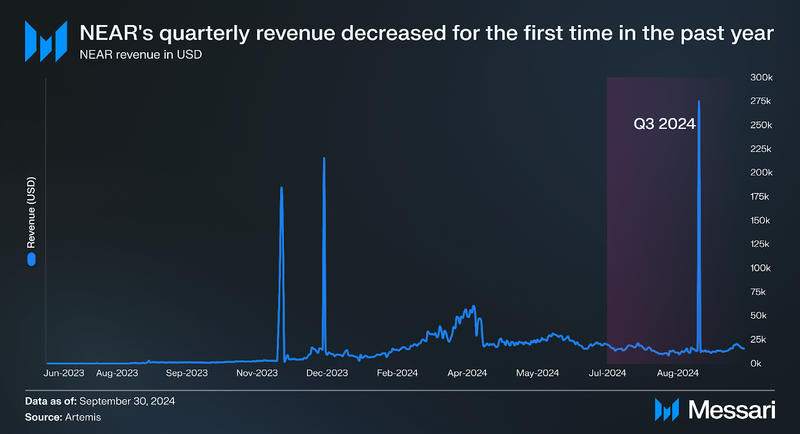
In Q3 2024, NEAR’s revenue, which measures network transaction fees but excludes storage staking, decreased to ~$1.64 million, marking a QoQ decrease of ~30.13%. This marks the first quarter in the past year that revenue ended the quarter lower than where it started. This decline can be attributed to the fall in overall transaction volume and improvements in protocol efficiency, which led to reduced transaction fees, which decreased QoQ by ~10.48% and ~34.23%, respectively.
NEAR employs a fee-burning mechanism for transaction fees, where 70.00% of all fees are burned while the remaining 30.00% is directed to the contract from which the transaction originated.
Supply
NEAR’s native token (NEAR) is used for staking, transaction fees, and storage fees. NEAR employs a combination of inflationary and deflationary measures, with no fixed token supply. The network follows a fixed annual inflation rate of 5.00%, with 90.00% of the inflationary rewards directed toward validators and the remaining 10.00% allocated to the protocol treasury.
As of Q3 2024, ~93.46% of NEAR’s total token supply is in circulation. Of the circulating supply, ~52.36% is staked. The annualized nominal yield from staking is ~8.60%, while the annualized real yield is ~4.09%.
Network Analysis
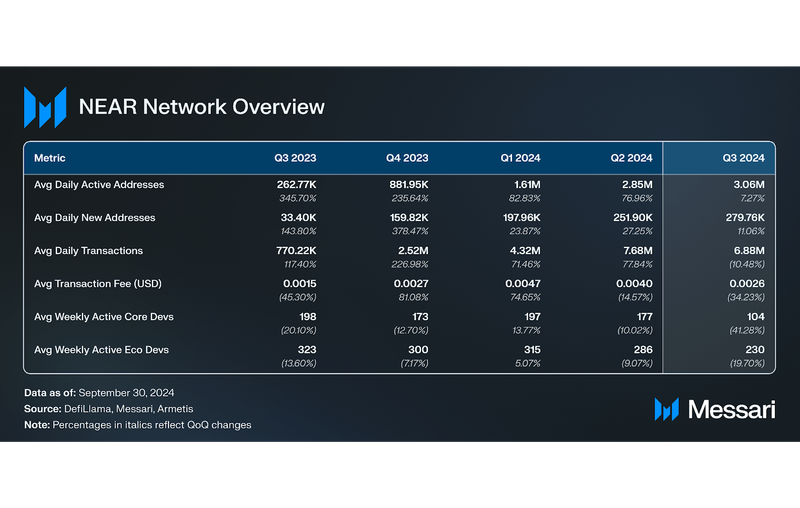
Usage
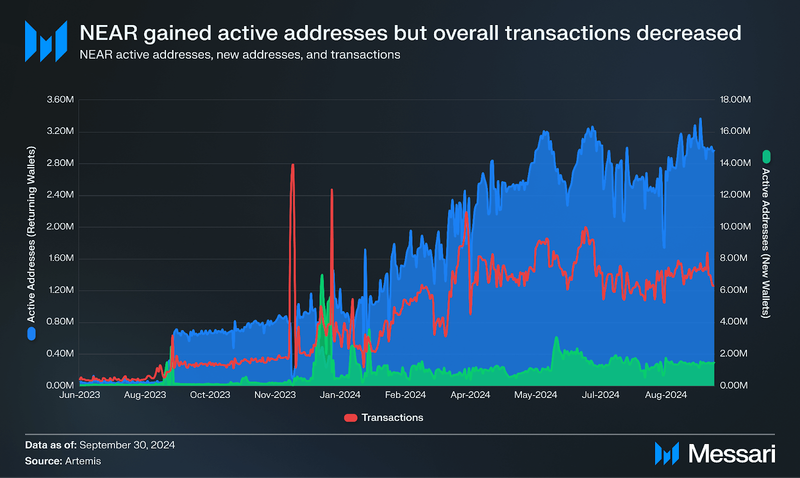
NEAR continued to experience increased levels of address activity while transaction volume decreased in Q3 2024. The average daily active returning addresses increased ~7.27% QoQ; the average daily new addresses increased ~11.06% QoQ; while the average daily transactions saw a decline of ~10.48% QoQ.
Development
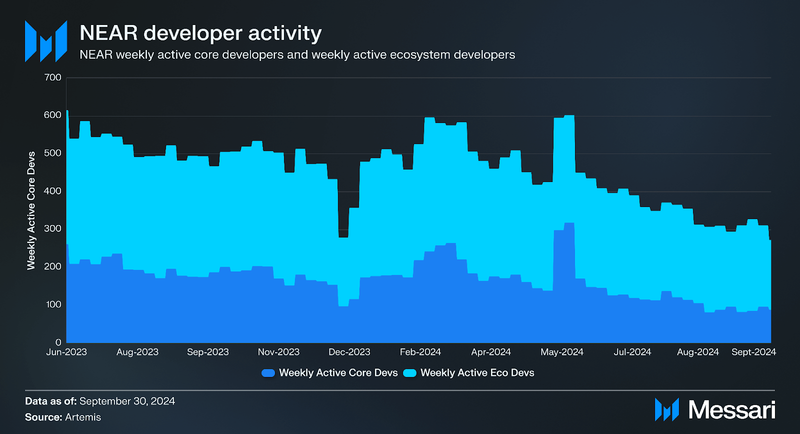
NEAR experienced a decline of its weekly active core developers by ~41.28% QoQ from 177 to 104, while weekly active ecosystem developers decreased by ~19.70% QoQ from 286 to 230.
NEAR places an emphasis on supporting developers, with 30.00% of transaction fees distributed to the creators of the smart contract called by a given transaction. In addition to this fee structure, NEAR offers an extensive suite of tools tailored for developers working within its ecosystem. These include SDKs for popular coding languages, sandbox environments, a NEAR CLI, and NEAR Developer Governance. The NEAR Dev Hub serves as a resource repository for developers, facilitating collaboration and innovation within the ecosystem. Early successes include sponsored hackathons, the formation of community groups, and collaboration on NEAR Enhancement Proposals.
Additional development activities in Q3 2024 included:
- The first bridge, TokenBridge, connecting NEAR and Solana, was launched on July 25, 2024. It is built by Crowny and powered by Wormhole technology.
Security
NEAR employs a Thresholded Proof-of-Stake (TPoS) consensus mechanism with three distinct validator roles: Block Producers, who are responsible for validating transactions across all shards; Chunk-Only Producers, who focus on individual shards with reduced hardware requirements; and Hidden Validators, who act as independent third-party monitors.
The implementation of Nightshade sharding began with Phase-1 in September 2022, enhancing the network’s capacity to support Chunk-Only Producers. By Q1 2024, NEAR launched Phase-2 of Nightshade sharding with six shards operational on mainnet, progressing towards the plan to expand to 100 shards. Q1 2024 also saw the launch of the Enterprise Node Operators program by Meta Pool in partnership with the NEAR Foundation, aiming to onboard leading institutions into the ecosystem. Stateless Validation, also known as Nightshade 2.0, launched on mainnet on Aug. 22, 2024. This upgrade improved throughput for each shard by 5x and increased the total number of shards available for the network.
By the end of Q3 2024, NEAR had 234 active validators and ~52.36% of eligible supply staked.
Governance
The Gauntlet partnership from Q2 2024 is off to a strong start, with the “House of Stake” governance proposal submitted on July 16, 2024. This proposal aimed to establish a more transparent, accountable, and efficient governance framework for the NEAR ecosystem utilizing veNEAR, a new governance token, to incentivize long-term commitment and active ecosystem participation. veNEAR is a non-transferrable governance token obtained by locking NEAR tokens for a set period. The voting power of veNEAR is directly proportional to the lock-up duration, for example; one NEAR locked for 12 months yields 1.50 veNEAR, and one NEAR locked for 48 months yields three veNEAR.
The “House of Stake” proposal also included:
- A Screening Committee to pre-screen proposals, evaluate the governance model’s efficacy, and adjust quorum requirements to prevent attacks.
- A Security Council, comprising the NEAR Foundation and core protocol experts, to oversee protocol development and security.
- An Endorsed Delegates system, where qualified community members can apply to become delegates, subject to specific criteria and responsibilities.
- A proposed 0.50% annual inflation rate to fund rewards for veNEAR tokenholders, up to 29.00 million NEAR annually for 500.00 million NEAR locked.
Ecosystem Overview
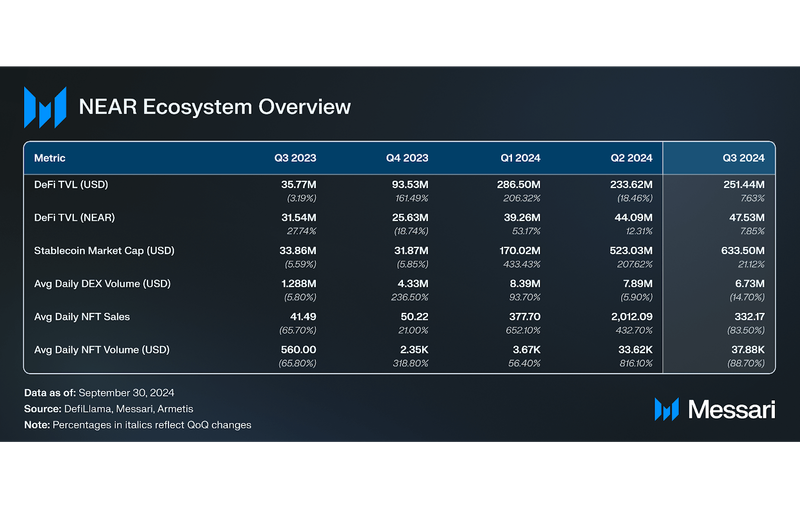
DeFi
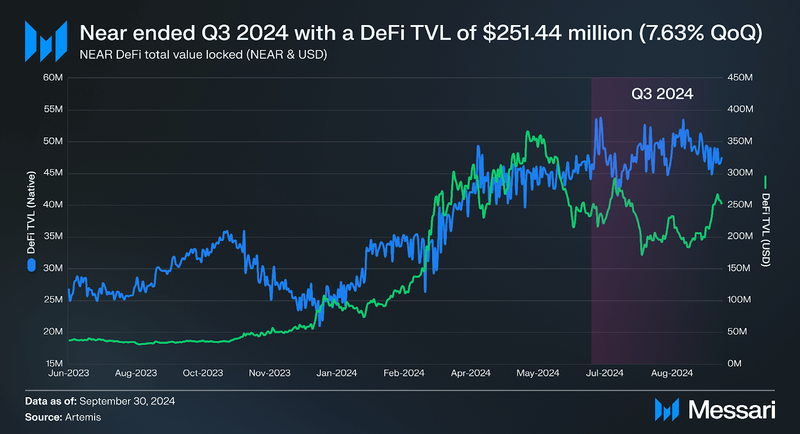
NEAR’s DeFi Total Value Locked (TVL) ended Q3 2024 at ~$251.44 million, reflecting a ~7.63% increase from the previous quarter.
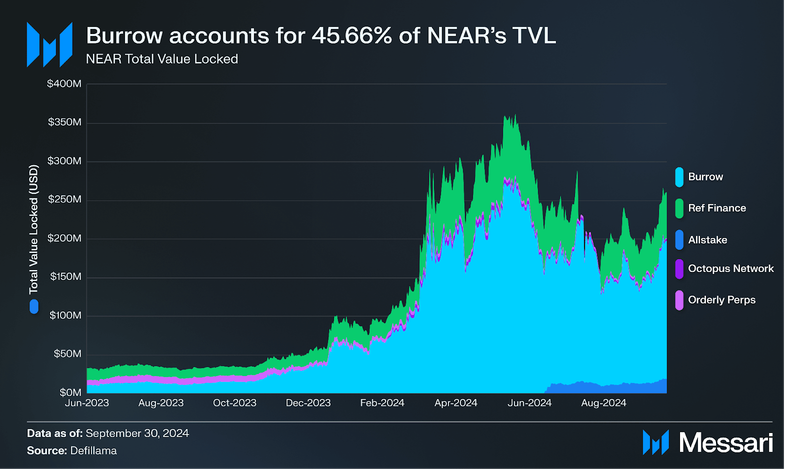
Burrow remained the leading protocol by TVL by a wide margin, sitting at ~$178.47 million, reflecting a ~13.69% QoQ increase and accounting for ~45.66% of the total TVL. Ref Finance followed with ~$59.50 million, a ~7.78% QoQ increase. Octopus Network had ~$2.79 million, showing a ~5.35% QoQ increase. Lastly, Allstake, which launched on June 20, 2024, finished Q3 with ~$18.49 million.
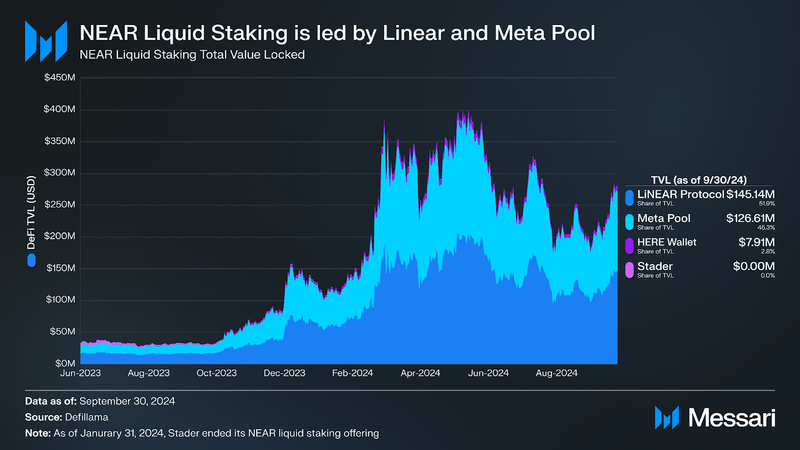
In Q3 2024, NEAR’s liquid staking TVL increased ~9.85% QoQ to ~$279.66 million. LiNEAR Protocol had a TVL of ~$145.14 million, reflecting a ~7.88% QoQ increase, while Meta Pool’s had ~$126.61 million, showing a ~12.70% QoQ increase.
Throughout the quarter, NEAR had an average daily DEX volume of ~$6.75 million, reflecting a ~21.51% decrease from the previous quarter. Ref Finance continues to be the leading DEX by volume on NEAR, with an average of ~$6.45 million in daily volume. In comparison, Orderly Network had ~$1.70 million in daily volume.
Other contributing factors to NEAR’s Q3 2024 DeFi ecosystem:
- The launch of Allstake, the omnichain restaking protocol, has attracted users looking to maximize their yields across multiple blockchains.
- Ref Finance launched the Burrow Ambassador Program to recruit community members to help increase engagement and promote the platform’s offerings.
- TruFin launched TruStake on NEAR, offering institutional-grade liquid staking. This integration enhances yield through automatic re-staking and provides instant liquidity via TruNEAR pools and exchange listings.
- Libre, a tokenization firm backed by Brevan Howard, has integrated with NEAR to enhance its asset tokenization services utilizing Chain Signatures. This gives NEAR users access to the Hamilton Lane credit fund, the Brevan Howard Master Fund, and the Blackrock ICS Money Market Fund.
- Open Forest Protocol is a Real World Asset (RWA) project to bring the carbon market onchain. NEAR’s sharding design provides the scalability necessary to accommodate data from hundreds of thousands of forest projects, a crucial factor for a project dealing with large-scale environmental data.
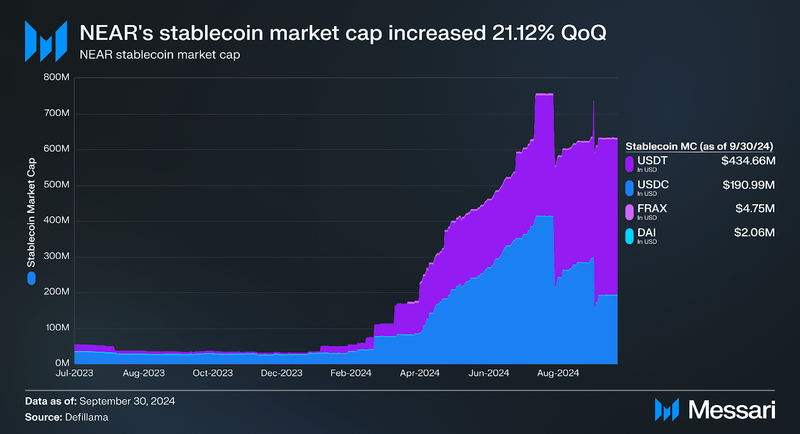
In Q3 2024, NEAR’s stablecoin market cap saw another increase, reaching a total of ~$633.50 million, up ~21.12% QoQ.
Nightshade 2.0
Nightshade 2.0 represents a significant advancement in NEAR’s sharding architecture and introduces stateless validation. A concept popularized by Vitalik Buterin, stateless validation allows validators to confirm transactions without storing the entire blockchain state locally and retrieve the necessary state information directly from the network, reducing resource requirements and operational costs, in addition to eliminating the need to maintain local shard states.
Nightshade 2.0 bolsters NEAR’s capacity to handle a growing number of users and transactions by an estimated 400.00% increase in transaction execution speed. The reduced operational costs lower barriers to entry for validators, while enhancing decentralization and security. Improved performance through faster transaction execution is crucial for supporting high-demand applications in DeFi and emerging use cases like User-Owned AI. Nightshade 2.0 lays the foundation for integrating future technologies, including dynamic re-sharding, further gas cost reductions, and optimized state witness sizes.
Where Nightshade 2.0 goes from here:
2024
- Optimization of state witness size to improve transaction throughput.
- Reduction of gas cost for storage operations.
- Resharding, which will lay the foundation for dynamic resharding.
- Improvement in node synchronization to rely less on centralized services.
2025+
- Addition of a transaction priority fee.
- Dynamic resharding to increase efficiency when a shard is overloaded or underutilized.
- Runtime performance improvements (still in the idea stage).
- Addition of leaderless consensus.
- Addition of sharded smart contracts to help with scalability.
Chain Signatures
Chain Signatures launched on mainnet on Aug. 8, 2024, enabling NEAR accounts, including smart contracts, to sign transactions on various blockchains, effectively eliminating the need for traditional bridges. This is done by leveraging a decentralized multi-party computation (MPC) network. This technology supports a wide array of ECDSA-based blockchains, such as Bitcoin, Ethereum, and Dogecoin, with plans to incorporate other EDDSA-based blockchains, such as Solana and TON, by the end of 2024.
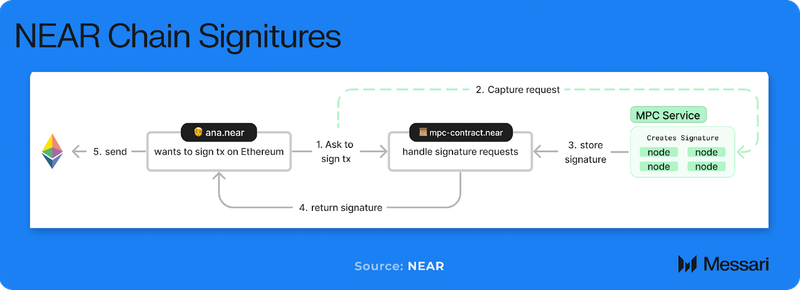
This broad compatibility positions Chain Signatures as a potential universal translator for blockchains, facilitating seamless interactions between diverse networks. For developers, Chain Signatures simplifies the creation of multichain decentralized applications by enabling a single NEAR smart contract to interact with several blockchains. A notable feature of Chain Signatures is the Multichain Gas Relayer, which simplifies gas payments across networks by allowing users to pay gas fees using assets held on NEAR, such as NEAR tokens or stablecoins.
Several applications are already utilizing Chain Signatures on NEAR’s mainnet, including the Sweat Wallet, which allows over 2.50 million active users to bridge assets to/from various blockchains. Allstake, an omnichain restaking protocol, utilizes Chain Signatures for cross-chain state synchronization, enabling users to restake assets across NEAR, Solana, Ethereum, and Bitcoin. HERE Wallet and Bitte Wallet are also leveraging Chain Signatures to offer multichain experiences, with Bitte Wallet enabling passkey wallets for any network, including Bitcoin. Near Intents, a demo app that showcases the possibility of a functional multichain spot DEX employs Chain Signatures to facilitate trades between assets on different networks.
As the technology matures, NEAR aims to expand Chain Signatures’ capabilities, adding support for more blockchains and exploring novel use cases. This is a key step towards achieving NEAR’s vision of Chain Abstraction.
While Chain Signatures offer a promising pathway toward greater interoperability, ensuring the security and reliability of the MPC network remains a challenge. Addressing these challenges as the technology gains wider adoption is crucial to ensuring Chain Signatures fulfill their potential to unify the fragmented blockchain landscape.
User-Owned AI
NEAR’s User-Owned AI initiative is a leader in integrating artificial intelligence with blockchain technology. This effort focuses on democratizing AI development, ensuring user control over data and assets, and fostering a decentralized framework for AI applications. Central to this effort is the concept of chain abstraction, which simplifies blockchain interactions and enables cross-chain AI computations. NEAR has showcased these innovations at major industry events like Token2049 Singapore and EthCC 2024 in Brussels, demonstrating AI-driven smart contracts, decentralized machine learning marketplaces, and the tokenization of AI models. The development of the NEAR AI Assistant and AI Developer concepts aims to support easier development through AI-driven platforms, which are mentioned in NEAR’s AI Master Plan. NEAR AI launched a closed alpha of the product in August and worked with AI teams in the ecosystem to refine its market offering. On Sept. 13, 2024, NEAR announced a partnership with Nillion, which will bring blind compute and storage to the network. Bitte.ai, a leading AI application built using NEAR, allows users to direct AI Agents to do a multitude of tasks onchain using natural language. Bitte showcases advanced AI use cases, such as the ability for users to send multiple transactions across multiple chains and create a paymaster for their community.
To further its vision, NEAR Foundation has launched AI accelerator programs in collaboration with Delphi Labs and Betaworks. NEAR also is hosting a worldwide hackathon, [REDACTED], with over $900,000 in prizes.
The ecosystem’s growth is underscored by significant developments such as Grayscale Investments’ launch of the Grayscale Decentralized AI Fund LLC, where NEAR tokens comprise nearly a third of the initial fund composition, reflecting strong investor confidence.
Data Availability
The NEAR Data Availability (NEAR DA) layer, which spun out as Nuffle Labs in Q2 2024, is designed to enhance data availability for Ethereum rollups in a cost-efficient manner. Partnerships include Arbitrum Orbit, Polygon CDK, Madara by StarkNet, Caldera, Fluent, OP, Gateway, and AltLayer. NEAR DA aims to substantially reduce developer costs by offering a cheaper alternative for call data. Comparative data highlights the cost efficiency of NEAR DA compared to other solutions. As of December 2023, 231 kB of calldata cost ~$0.0016 on NEAR, significantly lower than ~$140.54 on Ethereum mainnet and ~$0.046 on Celestia for the same amount of calldata. To look at live comparisons, visit Near Modular.
In Q3 2024, the Nuffle Labs team continued to see adoption of NEAR DA, with the integration into IoTeX 2.0’s Modular DePIN Infrastructure. This integration allows developers to access data from NEAR DA and verifiably compute it in W3bstream, IoTeX’s proprietary technology. The combination of NEAR DA and IoTeX’s blockchain platform addresses the need for fast, cost-efficient, and scalable data availability in DePIN applications.
Closing Summary
In Q3 2024, NEAR advanced significantly with the launch of Nightshade 2.0 on mainnet, introducing stateless validation and marking a pivotal enhancement in its sharding architecture for increased scalability and throughput. This upgrade was accompanied by key developments like the integration of native USDC to bolster DeFi liquidity, the release of Chain Signatures enabling cross-chain transactions without traditional bridges, partnerships to enhance data availability through NEAR DA, and taking a top position in Grayscale’s Decentralized AI Fund. The NEAR Foundation also allocated substantial resources towards User-Owned AI initiatives, including accelerator programs and a global hackathon with over $900,000 in prizes. Lastly, NEAR governance proposed “House of Stake,” introducing veNEAR, a new governance token, to incentivize long-term commitment and active participation in the ecosystem.

